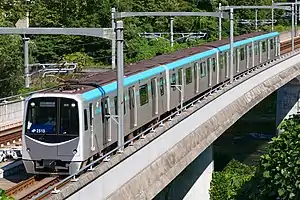Sendai Subway 2000 series
The Sendai Subway 2000 series (仙台市交通局2000系) is a Japanese rapid transit electric multiple unit (EMU) train type operated by Sendai City Transportation Bureau on the Sendai Subway Tōzai Line, which opened in December 2015.[2]
| Sendai Subway 2000 series | |
|---|---|
 Set 2110 in service in September 2021 | |
| Manufacturer | Kinki Sharyo |
| Constructed | 2013–2015 |
| Entered service | 6 December 2015 |
| Number built | 60 vehicles (15 sets) |
| Number in service | 60 vehicles (15 sets) |
| Formation | 4 cars per trainset |
| Fleet numbers | 2101–2115 |
| Operator(s) | Sendai City Transportation Bureau |
| Depot(s) | Arai |
| Line(s) served | Sendai Subway Tōzai Line |
| Specifications | |
| Car body construction | Aluminium alloy |
| Train length | 66.5 m (218 ft 2 in)[1] |
| Car length |
|
| Width | 2,494 mm (8 ft 2.2 in) |
| Height | 3,145 mm (10 ft 3.8 in) |
| Doors | 3 pairs per side |
| Maximum speed | 70 km/h (45 mph) |
| Traction system | Mitsubishi Electric MAP-144-15V265 2-level IGBT–VVVF[1] |
| Traction motors | 8 × Mitsubishi MB-7012-A 135 kW (181 hp) 3-phase AC linear induction motor[1] |
| Power output | 1.08 MW (1,450 hp) |
| Acceleration | 3.5 km/(h⋅s) (2.2 mph/s) |
| Deceleration |
|
| Electric system(s) | 1,500 V DC (nominal) from overhead catenary |
| Current collector(s) | Pantograph |
| UIC classification | 2′Bo′+Bo′2′+2′Bo′+Bo′2′ |
| Safety system(s) | ATC |
| Track gauge | 1,435 mm (4 ft 8+1⁄2 in) |
Overview
The fleet of 15 four-car linear motor-powered EMUs was manufactured by Kinki Sharyo.[3] Construction started in April 2013, with the first set delivered to Arai Depot during fiscal 2014 for testing.[4] The entire fleet of 15 sets (60 vehicles) was delivered before the line opened on 6 December 2015.[2][5]
Formations
The four-car trainsets are formed as shown below with car 1 at the Arai end.[2]
| Car No. | 1 | 2 | 3 | 4 |
|---|---|---|---|---|
| Designation | Mc1 | M1 | M2 | Mc2 |
| Numbering | 2100 | 2200 | 2400 | 2500 |
| Weight (t) | 28.3 | 27.5 | 27.6 | 28.4 |
| Capacity (total/seated) | 92/28 | 102/36 | 92/28 | |
The end cars are each fitted with one KP83C single-arm pantograph.[2]
Interior
Passenger accommodation consists of longitudinal bench seating, with a wheelchair space in each car.[2] The seats are 475 mm (18.7 in) wide per person.[2] 17-inch (430 mm) LCD passenger information screens are provided above each doorway, with information in Japanese, English, Chinese, and Korean.[2]
 Interior view in September 2021
Interior view in September 2021 Priority seating and wheelchair space in September 2021
Priority seating and wheelchair space in September 2021 An LCD passenger information display above a doorway in September 2021
An LCD passenger information display above a doorway in September 2021
History
In May 2012, Kinki Sharyo announced that it had received an order to build 15 new four-car 2000 series EMUs for the Sendai Subway Tozai Line.[3] The design of the new trains on order was officially unveiled by the Sendai City Transportation Bureau in November 2012.[6] The first train was shown off to the media at Arai Depot in October 2014.[7]
See also
References
- "Tozai Line Series 2000" (PDF) (in Japanese). pp. 31, 32. Retrieved 11 March 2023.
- 仙台市交通局2000系 [Sendai City Transportation Bureau 2000 series]. Japan Railfan Magazine. Vol. 55, no. 647. Japan: Koyusha Co., Ltd. March 2015. pp. 50–55.
- 仙台市交通局殿から東西線用新型車両2000系を受注しました [Order from Sendai City Transportation Bureau received for new 2000 series trains for Tozai Line]. News release (in Japanese). Japan: The Kinki Sharyo Co., Ltd. 2 May 2012. Retrieved 16 November 2012.
- 仙台市交通局2000系 [Sendai City Transportation Bureau 2000 series]. Japan Railfan Magazine. Vol. 53, no. 622. Japan: Koyusha Co., Ltd. February 2013. p. 71.
- <東西線>全15編成 勢ぞろい [Tozai Line: All 15 trains assembled]. Kahoku Shimpo Online News (in Japanese). Japan: Kahoku Shimpo Publishing Co. 15 July 2015. Archived from the original on 15 July 2015. Retrieved 7 December 2012.
- 仙台市営地下鉄東西線の車両デザインが決定 [Train design finalized for Sendai Subway Tozai Line]. Japan Railfan Magazine Online (in Japanese). Japan: Koyusha Co., Ltd. 14 November 2012. Retrieved 16 November 2012.
- 伊達な“いぶし銀" 東西線車両初公開 [Date-style dull silver Tozai Line trains shown off for first time]. Kahoku Shimpo Online News (in Japanese). Japan: Kahoku Shimpo Publishing Co. 15 October 2014. Archived from the original on 16 October 2014. Retrieved 7 November 2015.
External links
- Sendai City Transportation Bureau rolling stock details (in Japanese)